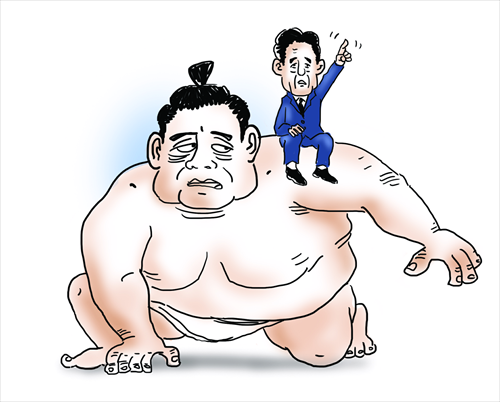HOME >> OP-ED
Double election helps Abe’s ambitious plans
By Chen Yang Source:Global Times Published: 2016-1-24 22:48:01

Illustration: Shen Lan/GT
As the world enters 2016, Japanese Prime Minister Shinzo Abe said in early January that he aims to win a two-thirds majority in an upper house election this summer which would enable him to revise the constitution.
This is not the first time that Abe has mentioned his ambition to revise the constitution. As early as 2007 shortly after he assumed power as prime minister, at a press conference, he declared that his cabinet aimed to realize a constitutional amendment. But the Liberal Democratic Party (LDP) suffered a severe defeat in the elections thereafter.
In The Philosophy of History, German philosopher G.W.F. Hegel argued that, "In all periods of the world a political revolution is sanctioned in men's opinions, when it repeats itself. Thus Napoleon was twice defeated, and the Bourbons twice expelled. By repetition, that which at first appeared merely a matter of chance and contingency becomes a real and ratified existence."
Based on Hegel's words, the upper house election in July will become an important turning point for Japan. If the history of 2007 repeats itself, it means the spirit of the peace constitution has become a social reality and cannot be shaken. Otherwise, it means Japan's postwar defense policies in the past 70 years will be changed. Peace and stability in Asia, or even the whole world, will be under threat.
Although there is six months' time to go before the upper house election, the ruling and opposition parties have begun their campaigns. They will pay attention to a lower house by-election in Hokkaido's Fifth Constituency scheduled in April. The by-election is considered as an indicator for the upper house election in July. Japanese media estimate that if the LDP loses in the constituency, Abe is likely to dismiss the lower house and a double election is possible.
This speculation did not arise from nothing. Since Abe lifted the ban on collective self-defense and forcefully passed security bills, support for Abe and his LDP has declined. Therefore, Abe has realized that his ruling party may not keep the absolute advantage in the election, especially the newly added 2.4 million young voters who may make for an uncertain election.
As for the by-election in Hokkaido in April, opposition parties in Japan are seeking a joint candidate to counter the LDP. If the opposition parties can win the by-election, such a cooperative means could be copied in the July election.
But if Abe dismisses the lower house, the opposition parties will fight on their own, and thus cannot form an alliance to counterbalance the LDP and its ally New Komeito. As such, a double election may guarantee the advantage of the LDP in Diet.
The increase in consumption tax in 2017 is also one reason for Abe's decision to dismiss the lower house. Currently, the terms for lower house members are set to expire in December 2018. The Japanese government will increase the tax rate to 10 percent from the current 8 percent from April 2017, which will definitely affect everyday life.
If an election is held at the lower house after April 2017, members of the LDP and the New Komeito may be voted out. Therefore, a double election will ensure the ruling party's dominance.
Abe may dismiss the lower house for personal reasons. Abe's term as the leader of the LDP will end in 2018. If Abe can lead the LDP to win in this year's upper house election, his term can extend to 2020 through special resolution.
According to LDP regulations, only its leader can serve as prime minister. The successful bid for the 2020 Olympics in Tokyo came during Abe's term. If Abe is still serving as prime minister at that time, he will achieve enduring fame. This is alluring for Abe.
All these can only be achieved with Abe leading his LDP. Therefore, give Abe's personal interest, the dismissal of the lower house and a double election is quite likely.
The author is a PhD candidate at the Graduate School of Sociology at Toyo University. opinion@globaltimes.com.cn
Posted in: Viewpoint